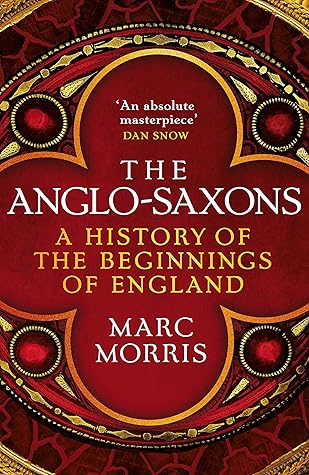More on this book
Community
Kindle Notes & Highlights
by
Marc Morris
Read between
December 27, 2022 - January 14, 2023
‘The Saxon’, he wrote, ‘is the most ferocious of all foes. He comes upon you without warning; when you expect his attack he slips away. Resistance only moves him to contempt; a rash opponent is soon down … Shipwrecks to him are no terror, but only so much training. His is no mere acquaintance with the perils of the sea; he knows them as he knows himself.’
The importance of the hall, its protection and its comforts, are evoked in a famous passage in Bede’s Ecclesiastical History, when one of Eadwine’s chief men invites the king to picture himself feasting with his followers in the middle of winter. ‘The fire is burning on the hearth in the middle of the hall, and all inside is warm, while outside wintry storms and snow are raging.’ Then suddenly a sparrow flies through the building, in one door and out the other. ‘For the few moments that it is inside,’ says the king’s adviser, ‘the storms and tempest cannot touch it, but after the briefest
...more
Surprisingly, perhaps, the argument had nothing to do with the use of the word ‘Easter’ itself to refer to the festival of Christ’s resurrection. Everywhere else in Christendom at this date used a variant of the word ‘Pascha’, the Aramaic for Passover, the Jewish festival on which Christ had been executed. But, as Bede explains in his book The Reckoning of Time, the Anglo-Saxons had always called the fourth month of the year ‘Eostremonath’, after a pagan goddess named Eostre, and persisted in using that name to refer to the new Christian ritual.
It also led to an absurd situation at the Northumbrian court, because King Oswiu adhered to the teachings of Lindisfarne, whereas his queen, Eanflæd, who was from Kent, followed the Roman tradition in which she had been raised. This meant that in some years Oswiu would be celebrating Easter Sunday and feasting with his courtiers while his wife and her circle were still observing their Lenten fast.
This was apparently a concern close to Charlemagne’s own heart, to judge from a story told by a later Carolingian chronicler. ‘What’s the use of these little bits of cloth,’ he said, testily, when presented with imported cloaks that were cut too short; ‘I can’t cover myself with them when I’m in bed, I can’t protect myself when against the wind and rain when I’m riding, and when I get down to answer a call of nature, I suffer because my legs are frozen.’
‘Times are dangerous in Britain,’ he told the archbishop of York, ‘and the death of kings is a sign of misery.’
‘Behold, a thing never heard of before,’ he warned, ‘a pagan people habitually makes pirate raids on our shores.’
Across large areas of northern and eastern England, we find many place names that end with either -by or -thorpe,
Ælfric of Eynsham, as well as supplying the earliest instance of the word ‘England’, also furnishes us with the first description of the life of an English slave. In a passage written from the imagined perspective of an unfree ploughman, he explains how he must rise at dawn and labour all day for fear of his master, however harsh the weather, until an acre or more has been ploughed. ‘Oh, oh, the work is hard,’ he laments, ‘yes, the work is hard, because I am not free.’
In the autumn they raided into Oxfordshire, Buckinghamshire, Bedfordshire and Northamptonshire, rounding off the year with a raid into Wessex before returning to their ships. Wherever they went, complains the Chronicle, the English army was somewhere else, and whatever plans the king and his counsellors devised lasted no longer than a month.


